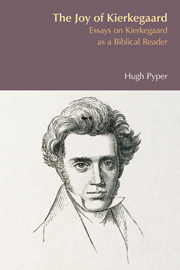Book contents
- Frontmatter
- Contents
- Preface
- Acknowledgments
- Abbreviations
- 1 The Joy of Kierkegaard
- 2 Kierkegaard's Canon: The Constitution of the Bible and of the Authorship in Concluding Unscientific Postscript
- 3 The Apostle, the Genius and the Monkey: Reflections on Kierkegaard's ‘The Mirror of the Word’
- 4 Your Wish Is My Command: The Peril and Promise of the Bible as ‘Letter from the Beloved’
- 5 The Lesson of Eternity: The Figure of the Teacher in Kierkegaard's Philosophical Fragments
- 6 Cities of the Dead: The Relation of Person and Polis in Kierkegaard's Works of Love
- 7 Adam's Angest: The Language of Myth and the Myth of Language
- 8 Beyond a Joke: Kierkegaard's Concluding Unscientific Postscript as a Comic Book
- 9 ‘Sarah Is the Hero’: Kierkegaard's Reading of Tobit in Fear and Trembling
- 10 How Edifying Is Upbuilding? Paul and Kierkegaard in Dialogue
- 11 Forgiving the Unforgivable: Kierkegaard, Derrida and the Scandal of Forgiveness
- Bibliography
- Index of Biblical References
- Index of Authors
8 - Beyond a Joke: Kierkegaard's Concluding Unscientific Postscript as a Comic Book
- Frontmatter
- Contents
- Preface
- Acknowledgments
- Abbreviations
- 1 The Joy of Kierkegaard
- 2 Kierkegaard's Canon: The Constitution of the Bible and of the Authorship in Concluding Unscientific Postscript
- 3 The Apostle, the Genius and the Monkey: Reflections on Kierkegaard's ‘The Mirror of the Word’
- 4 Your Wish Is My Command: The Peril and Promise of the Bible as ‘Letter from the Beloved’
- 5 The Lesson of Eternity: The Figure of the Teacher in Kierkegaard's Philosophical Fragments
- 6 Cities of the Dead: The Relation of Person and Polis in Kierkegaard's Works of Love
- 7 Adam's Angest: The Language of Myth and the Myth of Language
- 8 Beyond a Joke: Kierkegaard's Concluding Unscientific Postscript as a Comic Book
- 9 ‘Sarah Is the Hero’: Kierkegaard's Reading of Tobit in Fear and Trembling
- 10 How Edifying Is Upbuilding? Paul and Kierkegaard in Dialogue
- 11 Forgiving the Unforgivable: Kierkegaard, Derrida and the Scandal of Forgiveness
- Bibliography
- Index of Biblical References
- Index of Authors
Summary
‘I am not a religious person but simply and solely a humorist.’
(CUP1, 501)Concluding Unscientific Postscript is a joke. That, in a nutshell, is the thesis which I wish to put forward here. It presents itself as a joke and it is only by taking its character as such entirely seriously that we can deal in earnest with its message. It is no secret that irony, humour and the comic are featured throughout the book as matters of discussion and have important theoretical status as transitional modes between the stages of existence. The tone of the writing itself is by turns playful, satirical, ironic and mock serious. It is not these features which I propose to deal with directly here, however. Rather, I wish to call attention to the overall structure and presentation of the work. It is at this level, not in the components of its argument and rhetoric, that we shall see that the work is a joke, and, furthermore, that it could be nothing else if it was to be adequate to the task it sets out to perform.
Such a claim is not original. The point is well made by Andrew Burgess in his exhaustive investigation of the category of the comic in Kierkegaard's authorship. He summarizes the findings of his computerassisted analysis by pointing out the pervasiveness of the theme of the comic throughout most of the authorship, but finds it in particular at those points where the structure of the authorship is discussed.
- Type
- Chapter
- Information
- The Joy of KierkegaardEssays on Kierkegaard as a Biblical Reader, pp. 99 - 114Publisher: Acumen PublishingPrint publication year: 2012



